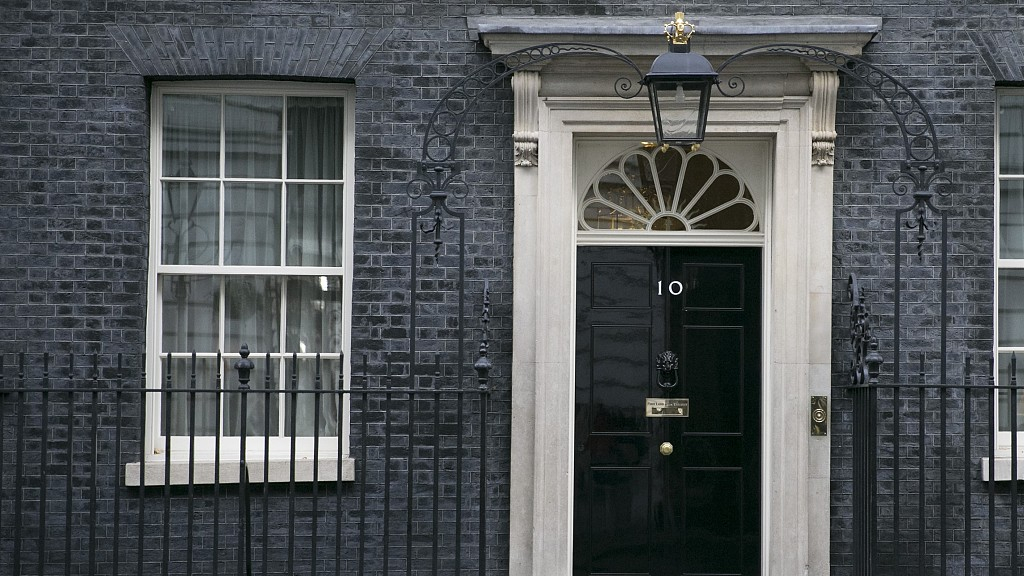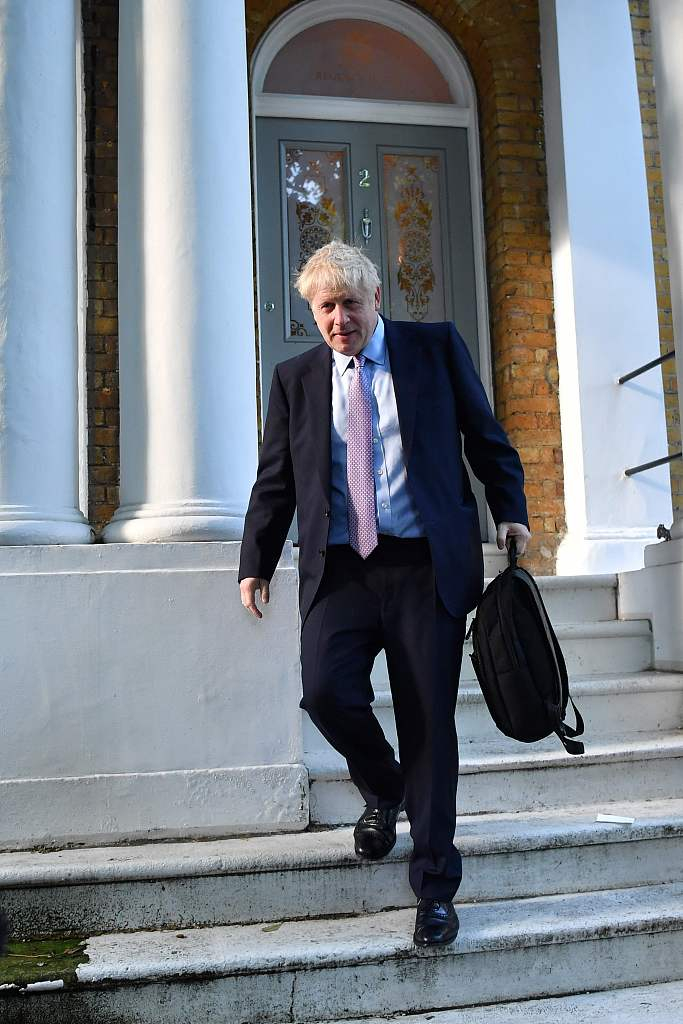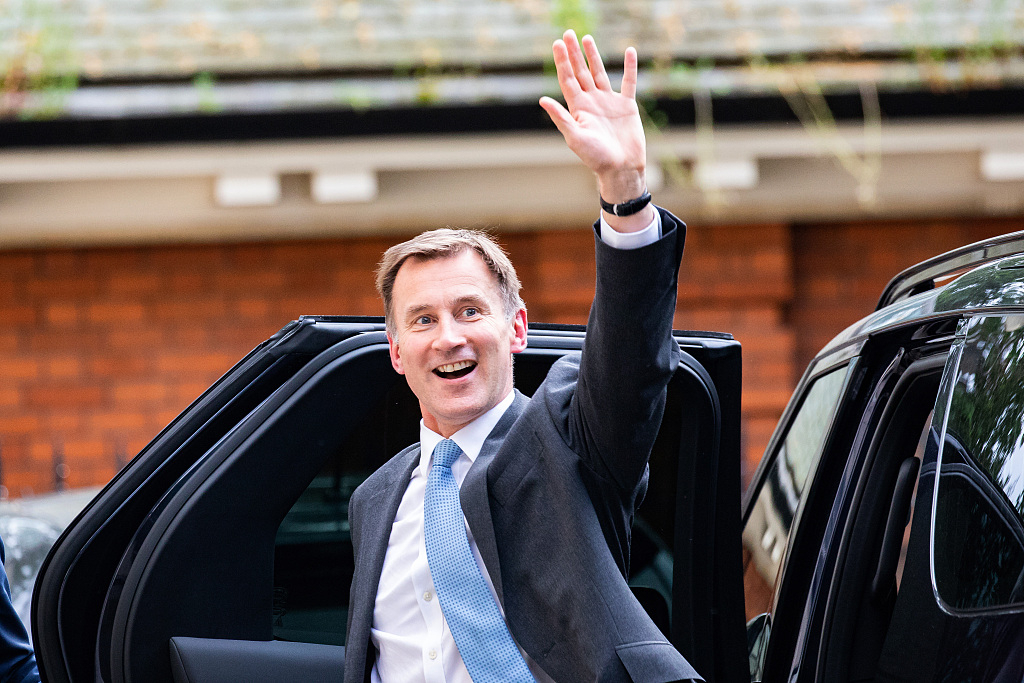

Editor's note: Chris Deacon is a postgraduate researcher in politics and international relations at the University of London and previously worked as an international commercial lawyer. The article reflects the author's opinion, and not necessarily the views of CGTN.
The contest to be the next leader of the UK's governing Conservative Party – and, therefore, Prime Minister – is now down to the final two: Boris Johnson and Jeremy Hunt. Johnson is still the stand out favorite among the bookmakers, so is the result now a foregone conclusion?
With Rory Stewart having been eliminated on Wednesday, Thursday saw a double elimination round to reduce the field from four to two. Firstly, Conservative Members of Parliament eliminated Sajid Javid – the current Home Secretary – in the morning. Then, in the afternoon, Michael Gove – the current Environment Secretary – was eliminated.
The final vote of MPs was incredibly tight. While Johnson was the clear winner with 160 votes, Jeremy Hunt – the current Foreign Secretary – only narrowly beat Gove, by 77 votes to 75. The closeness of the vote will draw attention back to accusations of skulduggery; it was alleged throughout the day that supporters of Johnson were "lending" votes to Hunt as they saw him as a weaker opponent for Johnson to face in the final two.

British Conservative MP Boris Johnson leaves his home in London, UK, June 20, 2019. /VCG Photo
The contest now moves to the final phase, in which the winner will be decided by rank-and-file members of the Conservative Party. These members are thought to number roughly 150,000, and to be mostly white, over 60, relatively wealthy and disproportionately male. Hunt and Johnson will travel around the country taking part in hustings and debates to try to convince these members to vote for them.
Some might question why such a small and unrepresentative "selectorate" is able to decide the UK's next Prime Minister. The reason is that the UK operates under a system of parliamentary democracy in which the public vote for their local MP – rather than a Prime Minister – and the proportion of those MPs elected to Parliament then decides which party's leader will become Prime Minister.
In the two-horse race between Johnson and Hunt, Johnson is the clear favorite. He has been such for the whole contest, but his victory now seems even more certain than before. The main reason for this is that the Conservative membership is very Eurosceptic and most members support Brexit. Jeremy Hunt – while now stating that he supports the UK leaving the EU, potentially even without a deal – supported Remain during the 2016 referendum. This sullies him in the eyes of many Tory members.
Worse still for Hunt, the party already has recent experience with a Remainer-turned-Brexiter as Prime Minister: Theresa May. While one can debate the extent to which May would ever have been able to implement a form of Brexit that pleased all of her party, her approach to Brexit and the deal she negotiated with the European Union became toxic among Tory members. They will not want another ex-Remainer to repeat these perceived mistakes.

Jeremy Hunt arrives at the Foreign Secretary's Grace and Favour residence in Westminster, London, UK, June 20, 2019. /VCG Photo
Michael Gove would have been a different prospect. Johnson would still likely have beaten him, but the fact that Gove also fronted the "Vote Leave" campaign during the Brexit referendum would have meant much stronger credentials on this important issue for Tory members. Gove is also widely considered to have a formidable intellect that Johnson feared coming up against in debates before members in the coming months.
The result, however, is not a foregone conclusion. Boris Johnson, perhaps more than any other prominent MP, is known to frequently make "gaffes" and embarrassing comments. His team has tried to keep him out of the limelight to the extent possible in the contest so far, partially in order to minimize this risk. But this will start to become very difficult during this final phase as constant publicity and media attention is inevitable.
Moreover, much like Donald Trump, Johnson has a "Teflon" quality about him – nothing sticks. His popularity has remained high, especially among Tories, despite repeated comments and actions which could have ended the careers of many other MPs, or – at the very least – destroyed any chance they might have of becoming Prime Minister one day.
At this point, the contest is entirely Johnson's to lose. While we cannot completely rule out the possibility of a Hunt victory, upsets have happened in this contest in the past. Given the particular circumstances of this contest and the state of British politics, however, it appears that something very surprising would be necessary to keep Boris Johnson out of 10 Downing Street come the end of July.
(If you want to contribute and have specific expertise, please contact us at opinions@cgtn.com.)

Copyright © 2018 CGTN. Beijing ICP prepared NO.16065310-3
Copyright © 2018 CGTN. Beijing ICP prepared NO.16065310-3